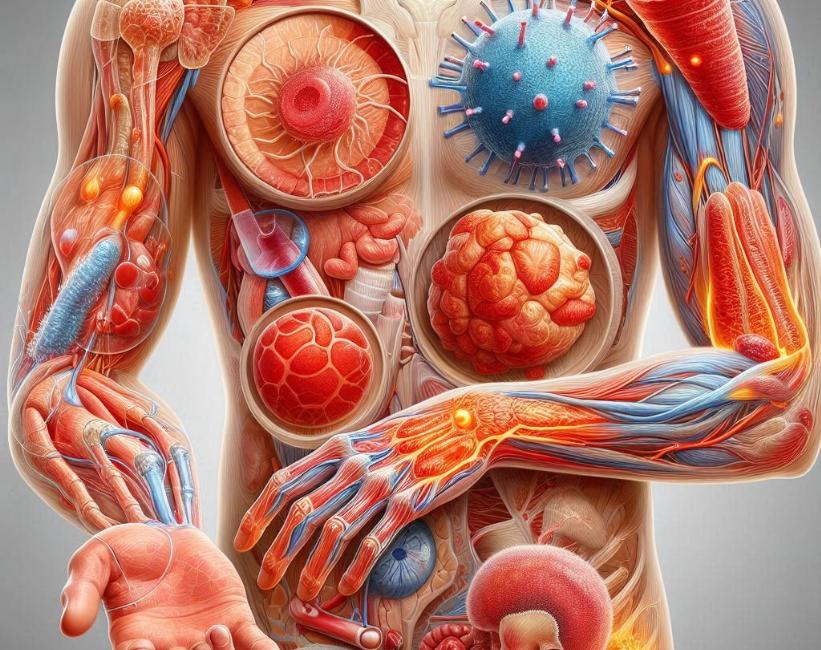How Inflammation Impacts Your Body & Health Risks
Inflammation is a fundamental aspect of the body’s immune response, serving as a protective mechanism against injury, infection, and harmful stimuli. While acute inflammation is beneficial and essential for healing, chronic inflammation can be a silent but deadly force, contributing to various serious health conditions. This blog post will delve into the intricacies of inflammation, examining what it does to the body, how it affects various systems, and the steps you can take to manage and prevent it.
Introduction to Inflammation
What is Inflammation? Inflammation is the body’s natural response to harmful stimuli, such as pathogens, damaged cells, or irritants. It is an essential part of the healing process, helping the body to repair tissue and defend against invaders. However, when inflammation becomes chronic, it can lead to a host of health issues.
Types of Inflammation
- Acute Inflammation: This type of inflammation is short-lived, typically resolving within a few days or weeks. It is the body’s immediate response to injury or infection, characterized by redness, swelling, heat, and pain.
- Chronic Inflammation: Unlike acute inflammation, chronic inflammation persists for months or even years, often without obvious symptoms. Over time, this can lead to tissue damage and contribute to diseases such as heart disease, diabetes, and cancer.
The Biology of Inflammation
How Inflammation Works Inflammation begins when the immune system recognizes a threat and sends white blood cells to the affected area. These cells release chemicals called cytokines that help control the inflammatory process. Blood vessels dilate to allow more immune cells to reach the site of injury or infection, causing the redness and heat typically associated with inflammation.
Stages of Inflammation
- Initiation: The immune system detects harmful stimuli and begins the inflammatory response.
- Amplification: Immune cells and proteins are recruited to the site of injury or infection.
- Resolution: Once the threat is neutralized, the body works to heal the damaged tissue and return to normal function.
Signs and Symptoms of Inflammation The classic signs of acute inflammation include redness, heat, swelling, pain, and loss of function. Chronic inflammation, however, may present with more subtle symptoms such as fatigue, digestive issues, and joint pain.
Causes of Inflammation
External Causes
- Infections: Bacterial, viral, and fungal infections are common triggers of inflammation. The immune system responds to these invaders by initiating the inflammatory process.
- Injuries: Physical trauma, such as cuts, bruises, or fractures, can also lead to inflammation as the body works to repair damaged tissues.
- Environmental Factors: Exposure to pollutants, chemicals, and toxins can irritate the body and trigger an inflammatory response.
Internal Causes
- Autoimmune Diseases: Conditions like rheumatoid arthritis and lupus cause the immune system to mistakenly attack healthy tissues, leading to chronic inflammation.
- Chronic Stress: Prolonged stress can elevate levels of cortisol, a hormone that can suppress the immune system and promote inflammation.
- Poor Diet: A diet high in processed foods, sugars, and unhealthy fats can contribute to chronic inflammation. These foods can lead to an imbalance in gut bacteria, which plays a critical role in immune function.
Inflammation Triggered by Lifestyle
- Sedentary Lifestyle: Lack of physical activity can lead to obesity, which is closely linked to chronic inflammation.
- Smoking and Alcohol Consumption: Both smoking and excessive alcohol intake can damage tissues and lead to inflammation.
Chronic Inflammation: A Silent Killer
Understanding Chronic Inflammation Chronic inflammation occurs when the body fails to resolve the inflammatory response after the initial threat has been neutralized. Over time, this persistent inflammation can cause damage to healthy tissues and organs.
Health Conditions Linked to Chronic Inflammation
- Cardiovascular Diseases: Chronic inflammation can lead to the buildup of plaque in the arteries, increasing the risk of heart disease and stroke.
- Metabolic Disorders: Conditions such as type 2 diabetes and obesity are closely associated with chronic inflammation. Insulin resistance, a hallmark of type 2 diabetes, is often driven by inflammatory processes.
- Autoimmune Conditions: Diseases like rheumatoid arthritis and lupus are characterized by chronic inflammation, where the immune system attacks healthy tissues.
- Neurodegenerative Diseases: Inflammation in the brain is believed to play a role in conditions like Alzheimer’s and Parkinson’s disease.
Symptoms of Chronic Inflammation
- Persistent Fatigue: Chronic inflammation can cause ongoing fatigue, even when you are getting enough sleep.
- Joint and Muscle Pain: Inflammatory conditions often lead to pain and stiffness in the joints and muscles.
- Digestive Issues: Symptoms such as bloating, gas, and reflux are common in individuals with chronic inflammation.
- Cognitive Impairment: Brain fog, characterized by difficulty concentrating and memory problems, is often linked to chronic inflammation.
The Impact of Inflammation on Major Body Systems
Cardiovascular System Chronic inflammation contributes to the development of atherosclerosis, a condition in which plaque builds up in the arteries, leading to heart disease and stroke.
Digestive System Inflammation can disrupt the delicate balance of bacteria in the gut, leading to conditions such as irritable bowel syndrome (IBS) and inflammatory bowel disease (IBD).
Nervous System Inflammation in the brain has been linked to mental health conditions such as depression and anxiety, as well as neurodegenerative diseases like Alzheimer’s.
Endocrine System Inflammation can interfere with hormone production and regulation, leading to insulin resistance and an increased risk of developing type 2 diabetes.
Diagnosing and Measuring Inflammation
Common Diagnostic Tools
- Blood Tests: Tests such as C-Reactive Protein (CRP) and Erythrocyte Sedimentation Rate (ESR) are commonly used to measure levels of inflammation in the body.
- Imaging Techniques: MRI and CT scans can be used to detect inflammation in tissues and organs.
Signs to Watch For
- Physical Symptoms: Persistent symptoms such as fatigue, pain, and digestive issues may indicate chronic inflammation.
- Medical History: A history of autoimmune disease or chronic infections can increase the risk of chronic inflammation.
Treating and Managing Inflammation
Medical Treatments
- Anti-inflammatory Medications: Non-steroidal anti-inflammatory drugs (NSAIDs) and corticosteroids are commonly used to reduce inflammation and relieve pain.
- Immunosuppressants: For autoimmune conditions, immunosuppressants can help reduce the inflammatory response.
Lifestyle Modifications
- Anti-inflammatory Diet: Eating a diet rich in anti-inflammatory foods such as leafy greens, berries, and fatty fish can help reduce inflammation. Avoiding processed foods, sugars, and trans fats is also crucial.
- Exercise and Physical Activity: Regular physical activity can help reduce inflammation by improving circulation and supporting overall health.
- Stress Management Techniques: Practices such as meditation, yoga, and therapy can help reduce stress and lower levels of inflammation.
Alternative and Complementary Therapies
- Herbal Supplements: Turmeric and omega-3 fatty acids are known for their anti-inflammatory properties and can be beneficial in managing chronic inflammation.
- Acupuncture and Yoga: These holistic approaches can help reduce inflammation by promoting relaxation and improving circulation.
Preventing Inflammation: Long-term Strategies
Dietary Approaches
- Foods to Avoid: To reduce inflammation, avoid processed foods, sugars, and trans fats, which can contribute to chronic inflammation.
- Foods to Include: Incorporate leafy greens, berries, fatty fish, and other anti-inflammatory foods into your diet.
- Importance of Gut Health: Maintaining a healthy balance of gut bacteria with probiotics and fiber is crucial for preventing inflammation.
Healthy Lifestyle Choices
- Regular Exercise: Engaging in regular physical activity helps maintain a healthy weight and reduces inflammation.
- Adequate Sleep: Getting enough sleep is essential for regulating immune function and preventing inflammation.
- Avoiding Toxins: Limiting exposure to toxins such as smoke, alcohol, and environmental pollutants can help prevent inflammation.
Monitoring and Maintaining Health
- Regular Health Check-ups: Routine check-ups with your healthcare provider can help detect and manage inflammation early.
- Importance of Mental Well-being: Managing stress and maintaining a positive mental outlook are key to reducing inflammation.
Conclusion: The Importance of Addressing Inflammation
Ignoring chronic inflammation can lead to serious health complications, including heart disease, diabetes, and neurodegenerative disorders. By understanding what inflammation does to your body and taking proactive steps to manage and prevent it, you can significantly improve your overall health and well-being. Start by adopting an anti-inflammatory diet, incorporating regular exercise, and managing stress to keep inflammation in check.
Common Symptoms and Associated Conditions of Chronic Inflammation
| Symptom | Associated Conditions |
|---|---|
| Persistent Fatigue | Chronic Fatigue Syndrome, Depression |
| Joint and Muscle Pain | Rheumatoid Arthritis, Fibromyalgia |
| Digestive Issues | Irritable Bowel Syndrome (IBS), Inflammatory Bowel Disease (IBD) |
| Cognitive Impairment | Alzheimer’s Disease, Brain Fog |
| Cardiovascular Issues | Atherosclerosis, Hypertension |
By understanding what inflammation actually does to the body and how inwhat inflammation does to your body, you can make informed decisions that will contribute to a healthier life, free from the long-term risks associated with chronic inflammation. Take control of your health today by understanding how inflammation affects the body and by making lifestyle changes that support your well-being.














Post Comment